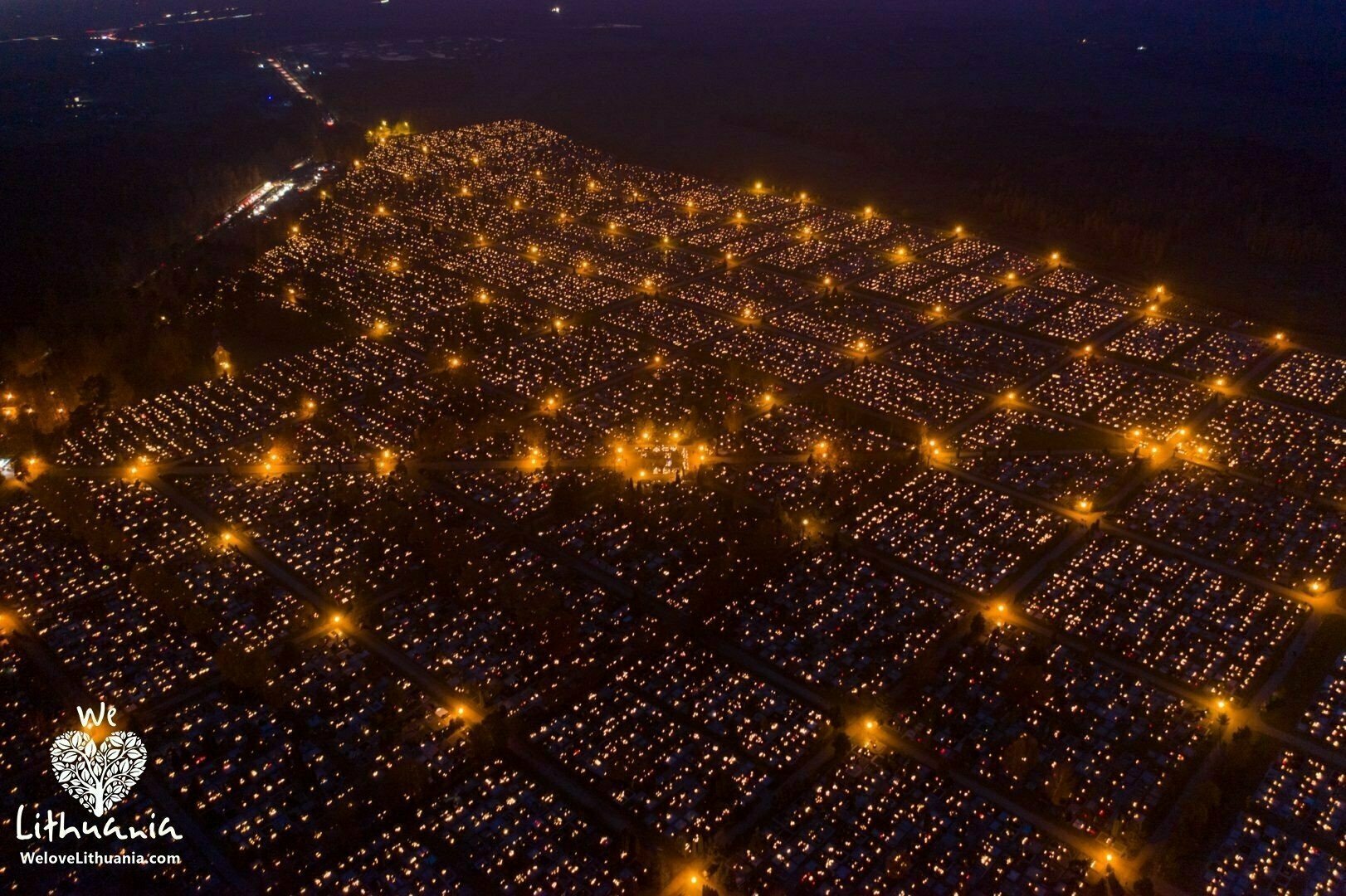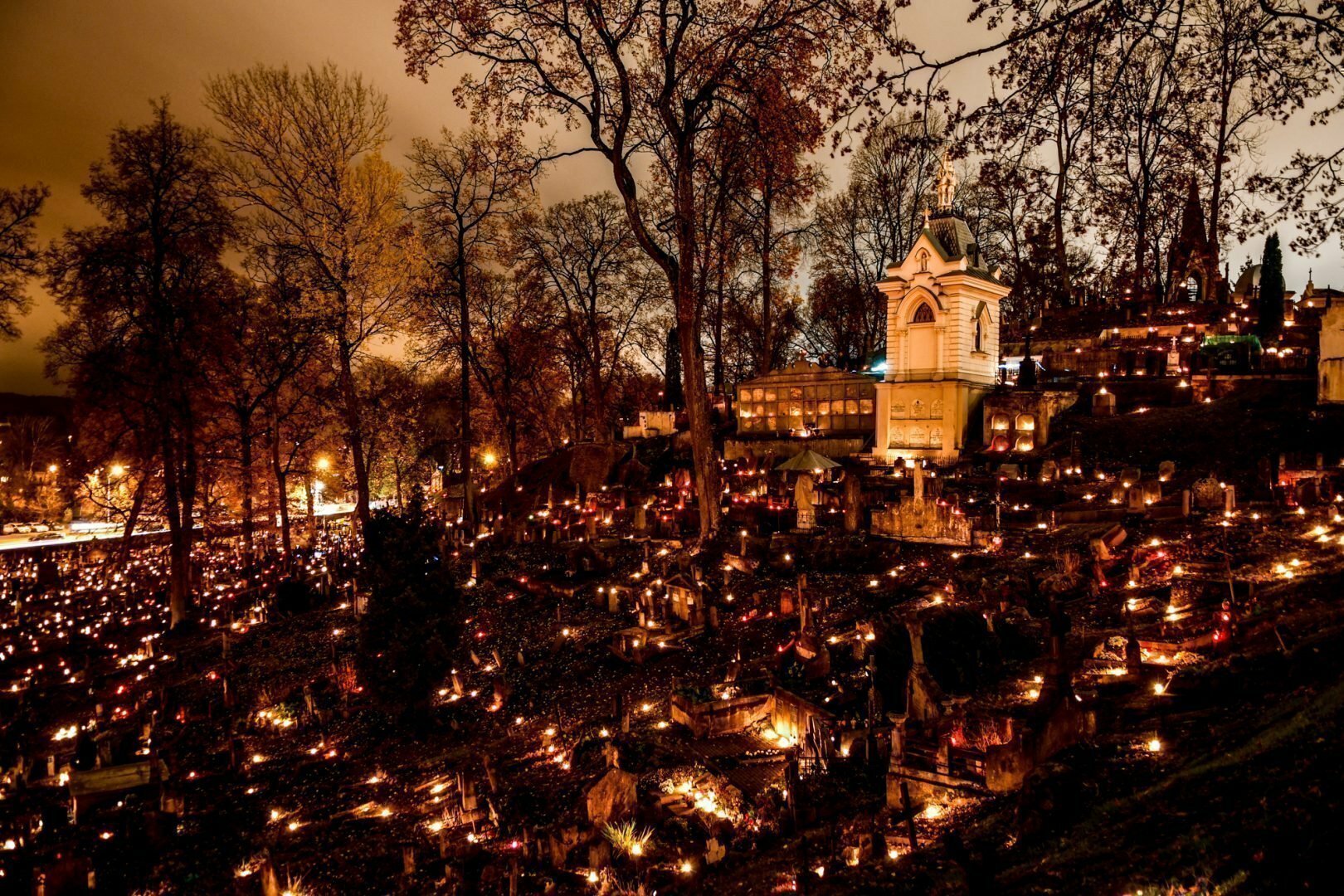All Souls’ Day or the Day of the Dead (Lith. vėlinės) on November 2nd is a day to honour all departed people. Visiting graves, lighting candles and praying for the dead are the most common practices on this day. The feast has pagan roots and earlier was known by the name Dziady.
There was a belief that when a person dies, the spirit (Lith. vėlė) separates from the body and later interacts with the living beings by visiting them. Lithuanian folk songs say that the dead man will sit on the “spirit bench,” then the mother’s beloved son will become “son-in-law of the spirits,” and the daughter — “daughter-in-law of the spirits,” and they will leave through the “gates of spirits.” Another belief was that spirits visit the places where they lived in real life, and their favourite time to visit is the gloomy autumn.

In ancient times, November was the month of dead humans’ spirit. But before, no one used to burn candles in the cemetery during All Souls’ celebration. In the 19th-century, in some regions of Lithuania and other European countries, people often prepared meals in cemeteries or at home and invited the dead to join. In the cemeteries, after dinner, everyone burnt bonfires and left food for spirits.
Later, special significance was assigned to fire. There was a belief that fire attracted spirits, so lighting candles on this day became very common.
It is also the time of the year for concentration, solemnity and answering the critical questions of being.
Interesting facts about All Souls’ Day:
-
-
- All Souls’ Day is the main autumn holiday and comes from paganism. Baltic tribes believed that a spirit separates from the body when a person dies but does not travel far: it visits the living and communicates with them. And most of the time — in the dark, gloomy and cold fall.
- All Souls’ Day is also known as Dziady. It is an ancient name for the celebration, which associates with longing and a feeling of death. Žemininkas (the ancient Lithuanian deity, who took care of homesteads, huts, animals and the farm in general) is known as the god of all souls and the spirit of the dungeon and the dead.
- In ancient times, during All Souls’ Day, people gathered in cemeteries and brought food. Most often, they left boiled eggs on the graves and watered the ground with wine or honey. Cemetery visitors also donated drinks to spirits that hid in the tops of the trees between the crosses. The celebration lasted for a few days, and during the time, people lit the holy fire and offered sacrifices to the gods, especially to Thunder.
- At the table, during the feast, you must remain clean, as if rejuvenated. After baths, people left towels, clothes and food for spirits in the sauna.
- Bread, yucca, black pudding and other dark-coloured dishes were usual on the All Souls’ feast table. People donated food to the spirits before eating, and after the celebration, they donated food for the homeless.
- Burning candles in cemeteries is a recent tradition. Until then, there were spaces in graveyards for bonfires, where people burnt collapsed old crosses.
- In Samogitia (northwestern Lithuania), there was a belief that all the spirits are released from the purgatory after All Souls’ Day and no longer have to suffer.
- Strong winds often blow during All Souls’ Day. That is because the rising wind eases the movement of spirits, and they can return to the world of the living.
- In old times, people played the bagpipes on All Souls’ Day.
- During the late evenings of the celebration, telling spooky ghost stories is very common.
- If a passer-by wanders by the house late in the evening, the hosts invite him or her inside. That is because the person can be a spirit or a spirits’ messenger, who came to visit the living world.
- Wind whistling in the windowsills and shelters is not a late-night breeze but the weeping spirits that have left this world.
- Lithuanians in ancient times believed that it was wrong to burn a bound broom or cut logs and firewood on a doorstep. A spirit could burn down, or it could be cut through.
- A hot drink from rowan helps to deal with the fear of the dead.
- In pagan Lithuania, there was a custom of honouring spirits four times a year, during all four seasons.
- A similar but more frightening holiday to honour spirits was celebrated by the Celtic tribes. Celts were pagans that lived in what is now England, Scotland, Ireland and northern France. On All Souls’ Day, Celts dressed in costumes made of animal skins and heads. They burnt bonfires, performed various rituals, prayed for happiness for the upcoming year.
-
